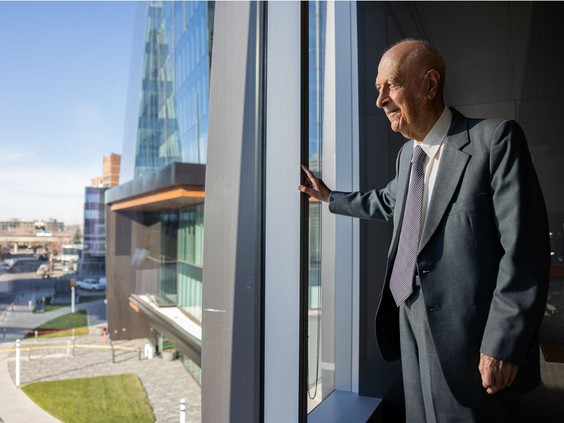
Karim Nasser makes his big dreams come true in Saskatoon
The Saskatoon developer's multi-faceted life and career was propelled by an appreciation for education he traces to growing up in Lebanon.
By Phil Tank | Saskatoon StarPhoenixKarim Nasser (PhD'65, DSc'16) has prepared a response for when he’s asked his age.
“You want the answer I normally give?” he says in an interview with the Saskatoon StarPhoenix on a sunny November day in the boardroom of Victory Majors, the company he founded. “I am one day older than yesterday. I never think of how old I am. I never did.”
The boardroom overlooks the public plaza amid the massive $300-million-plus complex Victory Majors led at River Landing to develop what was touted as the most valuable piece of real estate in Saskatchewan. The plaza, which is named for Nasser, was opened to the public in Saskatoon this summer.
Nasser’s son, John, who now runs Victory Majors, says Karim will turn 95 in December, although the exact date of his birth remains unknown due to poor record keeping in the mountain village in Lebanon where he grew up.
But Karim retains a vital life lesson from that small village near Beirut that helped guide his life — the importance of education.
“When I was growing up, there were one or two educated people in the village,” Karim says. “One was a lawyer. They were the well-known people there. If you needed something, you go to that fellow. So I said, ‘Gosh, if I want to be somebody, I have to get educated.’ ”
His education began in the village before he moved with his grandmother, an uncle and two aunts to live in a one-bedroom apartment in Beirut, where he completed his elementary certificate.
Karim wanted to further his education to get a university degree, but encountered three obstacles: He had no money, he spoke no English and “I’d never heard of high school.”
He had learned Arabic growing up and added French while attending a Greek Catholic school; there were no government-run schools in Lebanon at that time.
Karim struck a deal to work in the cafeteria at the high school next to the American University of Beirut in exchange for a high school education. Before he could start high school, though, he had to spend one summer learning English.
He continued working to pay his way through university, graduating with a degree in engineering, which he chose over medicine out of the only two disciplines available because it would take half the time.
Once graduated, Karim struggled to find work, encountering prejudice due to his Greek Catholic background.
But he was hired on the spot by the Trans-Arabian Pipeline Company. The company agreed to pay for his transportation when he wanted to get his master’s degree in Kansas in 1951.
“How lucky can one be?” Karim asks. “This is my question. Almost through my life, luck was on my side. I don’t know why.”
He moved to Saudi Arabia to work on a project there and married his wife, Dora. He finished the project and was offered an administrative job.
He rejected the idea of a life in the desert.
Education beckoned again, and he wanted to get his PhD in the United States.
“When we got married, I wasn’t supposed to be leaving,” he recalls. “I was supposed to behave and stay there and become a rich fellow in the desert.”
Karim and Dora moved to New Jersey to pursue his education. Then he moved to Canada and worked in Montreal and North Bay before accepting a teaching position at the University of Saskatchewan in Saskatoon.
He eventually completed his PhD in Saskatoon.
Karim still remembers driving the more than 2,000 kilometres from North Bay and being struck by the emptiness of the Prairies.
He also recalls the day in late October 60 years ago that he arrived in Saskatoon at dusk and saw the sparkling city lights.
“I said, ‘Oh that’s a wonderful place. Hopefully, that will be our place.’ ”
Karim was advised to get some experience building in Saskatoon so he would better appreciate the different standards for engineering.
That sparked a career that would alter the city of Saskatoon, where he decided to settle and raise his five children.
He built an eight-unit apartment building one summer and his business, then known as Victory Construction Ltd., grew. When he finally sold his apartment buildings to move on to commercial development, he had amassed 400 units, half of which his company had built.
“I’m open-minded,” Karim explains. “Let’s put it that way. My mind is not closed to anything. So when I hear something I think about it and see if it works or not. Can I do it? There’s need for me to do it? So I’m not afraid of things that I don’t know enough about them.”
In addition to university professor and developer, Nasser has also distinguished himself as an inventor. His most noteworthy invention is probably the K-Slump Tester — he often goes by Kay — which is used to test concrete.
The device was used in the construction of the CN Tower in Toronto in the 1970s and remains in use on construction sites.
Read the full article at https://thestarphoenix.com.

